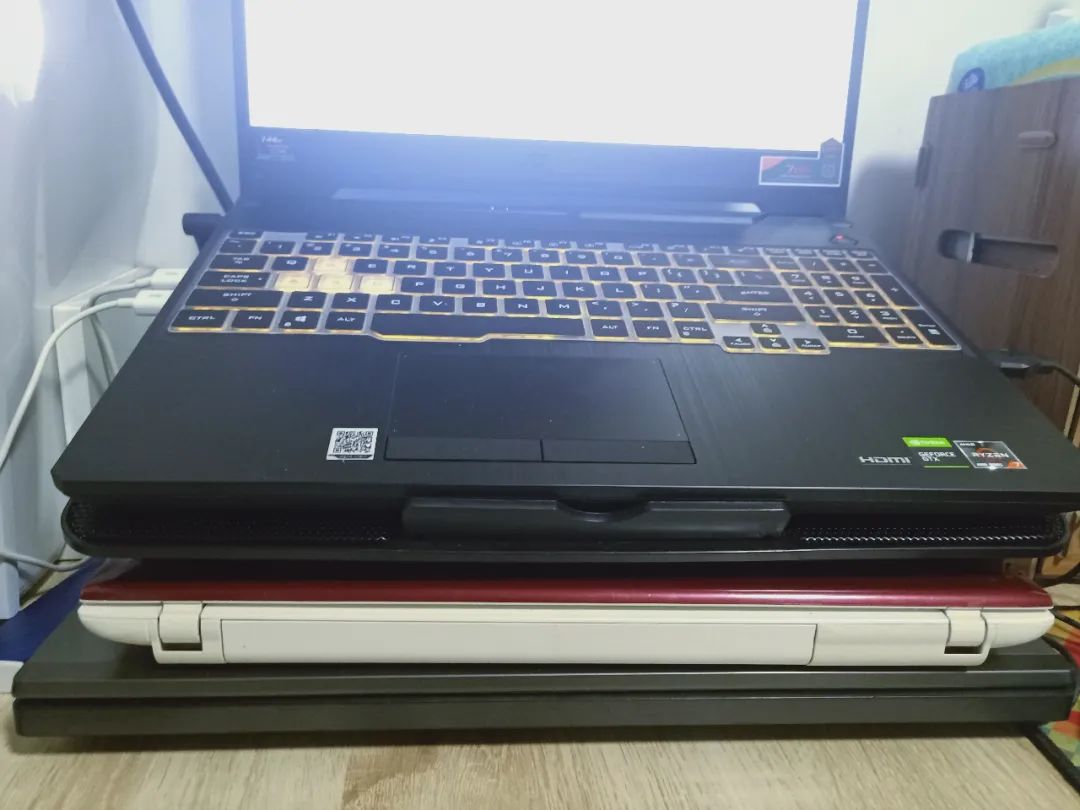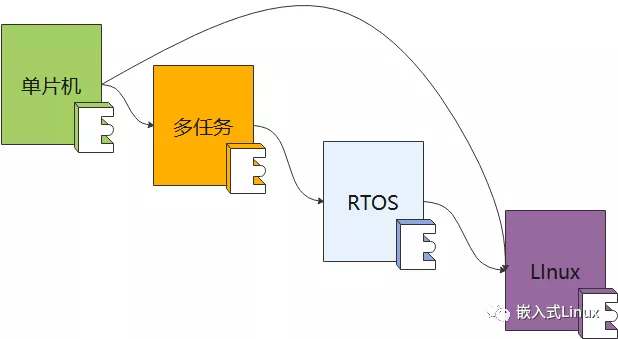Click on the top “Embedded Mixed Bag” and “Star the Public Account” to view embedded notes at the first time!
Hello everyone, I am ZhengN. Actually, this is a mixed article, haha~
It has been a long time since I last chatted, today is the weekend, and I will simply share my recent situation and some thoughts. Friends who often read this public account should have noticed that my frequency of writing original notes has decreased a lot in recent months. There are two reasons: on one hand, I had some health issues, and on the other hand, I changed jobs.
I remember that around last July and August, there was a time when my cervical spine suddenly hurt so much that I had difficulty getting out of bed; I had to crawl up slowly and rested for a while before recovering. Recently, my cervical spine hurt a bit; I was scared last year, so this time I instinctively wanted to rest and relax more. I used to often stay up until after midnight, but now I start to rest around eleven o’clock and also began to cook for myself. After a period of adjustment, my condition gradually improved. I am happy to say that my weight, which had been difficult to exceed a hundred since college, directly soared to 104 pounds this time:

I strive to reach my goal of 110 pounds before the New Year~
The reason for the pain in my cervical and spinal vertebrae is partly due to spending too much time in front of the computer and partly due to poor sitting posture. My computer was previously placed too low, causing me to look down. After raising the computer, it became much more comfortable:

Everyone should also pay attention to rest while working and studying; having a good body is more important than anything else.
Alright, let’s talk about work-related matters.
Don’t Jump Jobs Frequently
First, it needs to be emphasized: if you can avoid jumping jobs, do not jump; the cost of job hopping is extremely high. Here, I share my personal experience:
After graduating for two years, the thing I regret the most is that I did not consider the job search aspect properly, which led to frequent job hopping.
After graduating from my undergraduate degree, I had a decent hand of cards but lost them (first prize in three provincial competitions, scholarship, excellent student, outstanding intern, etc.), my foundation was not solid enough and I did not prepare well, missing the autumn recruitment and unable to go to my desired big company; during the spring recruitment, I settled for a state-owned enterprise. A year later, I found the situation was not good (software position, and there was actually no code to write), I felt that I had not made any progress but instead became unfamiliar with some things, and after realizing this, I quit my job without a backup plan.
Later, in urgent need of a job to support myself, I hastily joined a chip + product company after interviewing two companies in Shenzhen (among which the chip development was a new business), thinking that due to lack of experience I might not find a good job and without any economic source, I would settle down first, learn something, and accumulate some experience, and if it really didn’t work, I would make plans again. After a few months, I felt something was wrong; it was not what I imagined, initially I could do some applications, but later it gradually turned into a testing engineer??? It was very frustrating. I could only improve myself in my spare time.
At that time, I had just arrived in Shenzhen and was still unstable; I planned to reconsider in March or April of the following year. Unexpectedly, I encountered the pandemic, and it dragged on until July before I dared to change jobs. This time, I was very cautious, I did not dare to make choices lightly, did a lot of comparisons and research, and finally found a decent job.
In the early stages of my career, the cost of frequently changing jobs is very high, especially when hopping back and forth between different industries, it is difficult to accumulate industry experience well. I believe that within three years after graduation, if you can avoid changing jobs, you should avoid it. You can allow yourself one chance to make a mistake, but like me, jumping twice is a bit risky; think carefully before acting.
My summary of the first two unsatisfactory jobs is as follows: (1) Did not prepare well for campus recruitment. Campus recruitment is a rare opportunity; friends still in school should cherish it and practice the questions they need to practice. (2) Lack of interview experience. I did too few interviews during the first two job searches, which resulted in not having enough information to make decisions, leading to hasty choices.
Step by Step
Borrowing a picture from Brother Fa (public account: Embedded Linux):

This picture describes two paths from microcontrollers to Linux. One path is to jump directly to Linux after initially learning microcontrollers; the other is microcontroller -> multitasking -> RTOS -> Linux. I took the second path, whether in work or self-study, I have walked step by step like this. Now, I have finally reached embedded Linux.
Everyone must have some understanding of microcontrollers and embedded Linux; I think the best opportunity to work with embedded Linux is during graduation.
Microcontrollers and embedded Linux are two subfields; after graduation, if you want to transition from microcontrollers to embedded Linux, that is quite a leap. After working with microcontrollers for a while, when looking for positions related to embedded Linux, there are n reasons for them to reject you; don’t ask me how I know…
Here are some shares for those who want to transition from microcontrollers to embedded Linux:
Do well with microcontrollers and learn embedded Linux well. Opportunities are always reserved for those who are prepared. I learned Linux in my spare time; readers who have been following my public account for a while should know that around March, I bought a board from Teacher Wei and was learning according to the materials of the board. After spending some time, I basically finished learning the content of the materials (many updates have been added now), and I also made some summary notes and shared them on my public account, in conjunction with the materials from ZD and Wildfire.
Although I am inclined to develop in the application direction, I am also interested in other aspects; having some breadth is necessary to deepen our understanding of the whole.
Then, when looking for a job, my idea was: apply for both aspects; if I find a position in embedded Linux, that would be better; if not, finding a job related to microcontrollers shouldn’t be a problem as long as I find the right industry, it can also be quite rewarding, and we will discuss this later.
When looking for a job, for those of us who have only worked with microcontrollers before, applying for positions that require only embedded Linux is still quite difficult. However, those that are related (the job requirements are mostly related to microcontrollers, but there is one: familiarity with Linux is preferred) have a great opportunity; look for more of these edge cases.
I found such an edge case position, which required STM32 + RTOS, Linux. During the interview, they asked all about it. But I ended up doing Linux-related work inside, and I was not asked to do microcontrollers, which was unexpected but also quite suitable for me. Although I am still at the entry level of Linux, I have finally crossed the threshold, and I can slowly catch up later.
Find the Right Focus
Just graduated, we may be pursuing technical growth more, such as learning STM32, learning embedded Linux. Since I am doing business/application development, I will explain it from the application side; this may not apply to other positions. We need to clarify that from a product perspective, STM32 and embedded Linux are tools; if we only use tools, our value may not be that high. For example, in consumer electronics, how to design our functionality/application/business logic will enhance user experience.
Doing applications is closest to product demand, requiring us to consider product-related aspects more, and this can be accumulated as experience. In the first three years after graduation, we may find a job by solving a few problems during interviews, but as work experience increases, the questions asked in interviews when looking for jobs later may focus more on product experience.
For example, a very skilled application development engineer in audio products may not do well when switching to some industrial applications. Therefore, we can find a focus and continue to delve into it, accumulating industry experience; this experience can later be monetized. So, even if we only know STM32, if we can find a promising industry and delve into it, that can also be quite rewarding.
Some Advice for Students
If I could start over, I would definitely pursue a master’s degree and then focus on algorithms; algorithms are very valuable. Today, a friend from my previous company who resigned to pursue a master’s degree asked me how to choose a direction. He said that working with ROS and algorithms is too difficult; should he switch to embedded or JAVA? My advice to him is: if you can work on algorithms, do it; if not, transitioning back to embedded is also fine, but switching to JAVA is a bit risky with too much sacrifice and requires more investment.
What a Coincidence, Became Colleagues with Osprey
Osprey is the owner of the public account Osprey Talks Microcontrollers. We met in the public account owner group; around April or May, we added each other as friends and had a good chat, which is how we got to know each other.
Then around June or July, several public account owners related to embedded in Shenzhen met offline; it was Osprey who came to the door to pick me up, which left a deep impression. Later, when I started my new job, I saw Osprey and recognized him at a glance; we are in the same project team, what a coincidence…
Osprey takes me to work early every day, which has made me much bolder, haha. Osprey is our powerhouse, treating various difficult problems. Everyone can follow Osprey Talks Microcontrollers to see advanced materials on microcontrollers.
Apologies and Thanks
Thank you very much for your attention and support. You should have noticed that I started posting some sponsored articles in the last three months, which I am very sorry for. I have mentioned before that my main purposes for operating this public account are:
1. Improve my technical and writing skills.
2. Meet more friends.
3. Make money.
First of all, I need to focus on improving my abilities, allowing my comprehensive skills to be exercised through output forcing input.
Secondly, I hope to meet more like-minded friends during the operation of this public account. We in technology should not only focus on technology but also continuously expand our network.
Today, we help others, and in the future, many people may come to help us.
Finally, it’s about making money; I hope everyone can understand. Occasionally taking on some promotions can improve my meals and provide some benefits to friends from time to time. Thank you again for your support.
You Might Also Like
From the Perspective of a Microcontroller Engineer on Embedded Linux
Why Were Ten-Year Experienced Engineers Laid Off?
1024G Embedded Resources Giveaway! Including but not limited to C/C++, microcontrollers, Linux, etc. Reply “1024” in the public account chat interface to get it for free!
